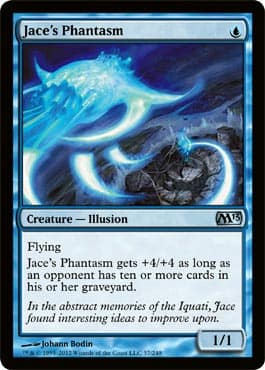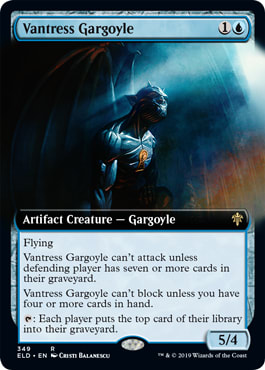Since Antiquites' Millstone, the concept of winning by eating through an opponent's deck until they run out of cards has captivated many players. Usually, one would need an entire deck dedicated to such a strategy, and to play mill and damage-based win conditions in the same list would be suboptimal. Today's deck, however, does just that. Today, we're milling cards to beef up creatures with Aggro Mill!
Mono-Blue Aggro Mill | Casual | James Heslip
- Creatures (18)
- 2 Relic Golem
- 4 Jace's Phantasm
- 4 Merfolk Windrobber
- 4 Overwhelmed Apprentice
- 4 Vantress Gargoyle
- Instants (18)
- 3 Into the Story
- 3 Thought Collapse
- 4 Lofty Denial
- 4 Thought Scour
- 4 Winds of Rebuke
- Sorceries (4)
- 4 Tome Scour
- Land (20)
- 18 Island
- 2 Ipnu Rivulet
Cost: $14 at the time of publication
The Core
Jace's Phantasm is the most powerful of our win conditions. Though it's more difficult to bring online, a 5/5 flying creature for one Blue mana is hard to trump. The low casting cost and flying ability makes it passable as a threat even before you reach the ten card requirement, which means you're happy to see this illusion at any point in the game.
The second of our primary win conditions is Vantress Gargoyle. Because it only requires seven cards in our opponent's graveyard (as opposed to Phantasm's ten) Gargoyle is easier to bring online. The built-in mill ability ensures a sort of inevitability as well. Though it costs an extra mana to cast, Vantress Gargoyle fits too well to pass up.
Relic Golem is our final win condition. Though it's bigger than our fliers, and also comes with a built-in mill effect, the lack of evasion and higher mana value forces us to put much less emphasis on his use compared to the two previously mentioned threats.
The Backup
Into the Story is another mill-reliant payoff card. In the later stages of the game, it can easily swing the tide in your favor by refilling your hand with threats and interaction. Similar to the gargoyle, all you need is seven cards in the graveyard across from you.
With all of our payoff cards decided on, we want to find ways to bring them online as quickly and reliably as possible. Tome Scour is the most straightforward of mill effects that we play. For one mana, we are at least halfway to each of our primary threats realizing their full potential. Thought Scour is similar. It doesn't mill as many cards, but it helps us dig into our own library to find threats or utility.
Speaking of utility, a few of the interaction spells played in the list serve double duty as mill spells as well. Thought Collapse mills three while also protecting you or your threats, and Winds of Rebuke mills two while also bouncing opposing creatures or other pesky permanents. While it doesn't mill, Lofty Denial is a less mana-intensive counter spell that is easy to take full advantage of thanks to our twelve total flying creatures.
Merfolk Windrobber is an early threat that works to slowly drain your opponent's life total and library count at the same time. He can also serve as card draw in a pinch. Overwhelmed Apprentice is another 1-drop that mills, while also serving as a body. Though it doesn't have the evasion of your other creatures, the inundated wizard influences your draws, ensuring consistency.
Playing the Deck
Think of Aggro Mill more like a midrange list. You will spend the early turns of the game playing threats and bringing them online. From there, you will use your counter magic and other disruption spells to keep those threats alive and put in a wrench in the enemy's plans. If all goes well, you will be victorious in the early or mid-game, well before they are able to find their footing.
Playing your early 1-drops, like Jace's Phantasm
Merfolk Windrobber, or Overwhelmed Apprentice can help to apply early pressure, while in the cases of the merfolk and the wizard, still milling cards. Don't commit more than you have to, though. Your counters and bounces will mill as well as your creatures, and still keep your opponent off their game plan. Additionally, every card your opponent plays on their own potentially adds to their graveyard count. This means you have some inevitability on your side. If you need to play slowly in order to ensure the best use of your counter magic or bounce spells, then do so. While this list can be fast, it doesn't need to be.
There are cases where sequencing matters. Think of scenarios like this: you have enough mana to either play Gargoyle, or cast a mill spell that would result in seven or more total cards hitting the enemy graveyard. In situations like this, even though your gargoyle is "useless" at the moment, and it may be tempting to cast the mill spell to bring him online, the correct play would actually be to summon the creature. This way, you eliminate summoning sickness as early as possible, and there's nothing stopping you from simply casting the mill spell on the following turn. Here, you've done everything you wanted, and are able to attack one turn earlier.
Still speaking on sequencing, cast Overwhelmed Apprentice before Thought Scour. The resultant draw will not be as blind as it otherwise would be, and you again eliminate summoning sickness a turn faster.
Additional Options:
- 1 Memory Sluice
- 1 Dream Twist
- 1 Merfolk Secretkeeper
- 1 Stream of Thought
- 1 Mind Sculpt
- 1 Didn't Say Please
- 1 Halimar Depths
- 1 Lonely Sandbar
- 1 Stubborn Denial
- 1 Zulaport Duelist
- 1 Delver of Secrets
Memory Sluice, Dream Twist, Merfolk Secretkeeper, Stream of Thought and Mind Sculpt would all serve similar roles as Tome Scour. They are all pure mill cards that serve no other purpose other than to beef our finishers as early as possible. If you like any of them more than Scour, I'd do a one-for-one swap. Merfolk is interesting in that it can serve as a blocker if needed, but I don't know how much the one card difference actually means. Finally, a single Mind Sculpt turns on Vantress Gargoyle and Into the Story in one go, which feels strong, but a mana-value of two is actually a big deal in such a strategy.
Stubborn Denial and Didn't Say Please are additional counter magic options. Denial is monetarily more expensive than most other cards in the deck, and is a bit more difficult to take full advantage of. Your finishers would already need to be full power before it could reliably protect them. However, as mentioned before, the difference between the single mana cost of Stubborn Denial is significant compared to its Lofty cousin.
Zulaport Duelist is another creature option, though the lack of flying kept it from being included in my list. Delver of Secrets, though, could be right at home. In some ways, it sucks to play such an omnipresent threat in a casual environment, but we certainly play enough instants and sorceries to justify his inclusion if we wanted to. Of course, playing a full four copies would also significantly increase the cost of the deck comparatively.



























